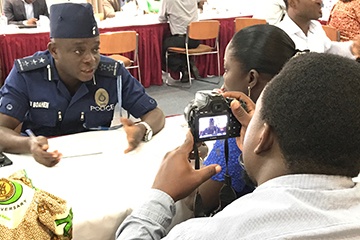April 7, 2025
 Media advocacy is one of the most effective ways to elevate public health issues and create an environment where policy change is possible. In 2017, the Global Health Advocacy Incubator (GHAI) saw this demonstrated across the world, when we trained journalists in nine cities about road safety in their countries.
Media advocacy is one of the most effective ways to elevate public health issues and create an environment where policy change is possible. In 2017, the Global Health Advocacy Incubator (GHAI) saw this demonstrated across the world, when we trained journalists in nine cities about road safety in their countries.
The trainings supported our partners’ advocacy to save lives through proven interventions that reduce road traffic deaths. The workshops were held around the globe – from Accra, Ghana, and Mumbai, India, to Bandung, Indonesia, and beyond.
Partners call on GHAI to help plan and execute media campaigns. These might include social media, traditional media, or paid ads. They are meant to provide journalists with information they need, while also providing our partners with tools and relationships to continue building support for public health policies. For example, the road safety trainings:
- Boosted favorable media coverage of the policies and interventions prioritized by our partners, to improve the safety of all road participants.
- Generated information on journalists and digital media influencers’ skills, interests, needs and follow-up opportunities.
- Strengthened and expanded our partners’ relationships with influential journalists and digital media influencers.
- Improved our partners’ understanding of how media works and how best to communicate with journalists and digital media influencers.
- Showcased the expertise and leadership of our local and international partners, including the World Health Organization.
- Inspired an off-the-shelf road safety journalism model curriculum that can easily be adapted to a variety of national contexts.
In each location, we worked with our partners to develop a customized training agenda, identify spokespeople, refine messages, and design materials. We also helped each partner to incorporate trainings into broader communications strategies meant to cultivate media allies.
These efforts resulted in sustained media coverage of road safety risk factors and solutions—and increased political will to implement life-saving interventions, such as speed limits for vehicles and helmet requirements for motorcycle riders.
El Tiempo, Colombia’s leading news outlet, began to highlight the benefits of speed reductions. Fana Bc Radio’s daily road crash reports now feature more in-depth discussions of road safety, educating residents of Addis Ababa, Ethiopia, about risk factors and best practices. Brazil’s most influential TV channel, TV Globo, dedicated one edition of its popular health program Bem Estar to road safety, reaching more than 6 million viewers with important information about drunk driving and cell phone use. And our partners’ work continues to be featured in popular news outlets such as Radio Ghana and India’s DD News and DD Sahyadri.
Our partners continue to build on those successes as they work to save lives.
Photo: DSP Edu Boahen, a staff officer with the Motor Transport and Traffic Directorate, answers questions from reporters during an interactive session that is part of a GHAI-supported journalism training in Accra, Ghana on August 1, 2017.



